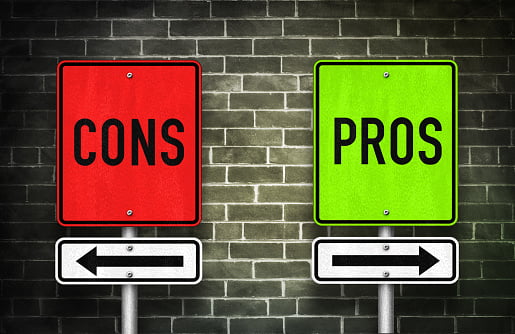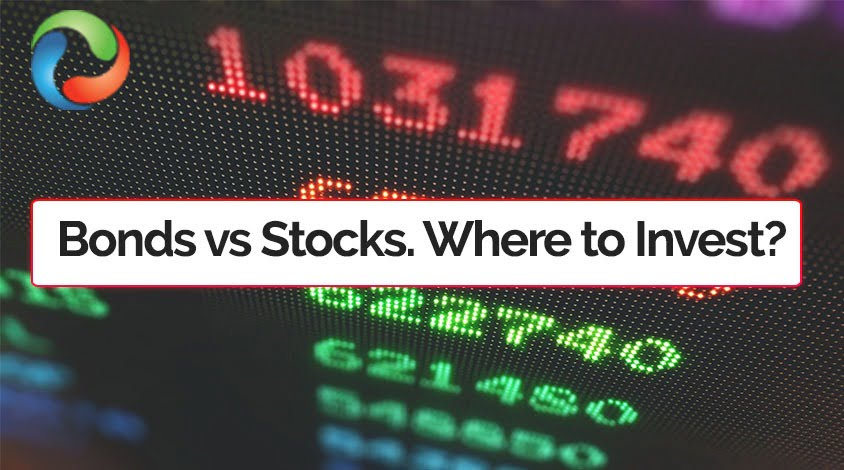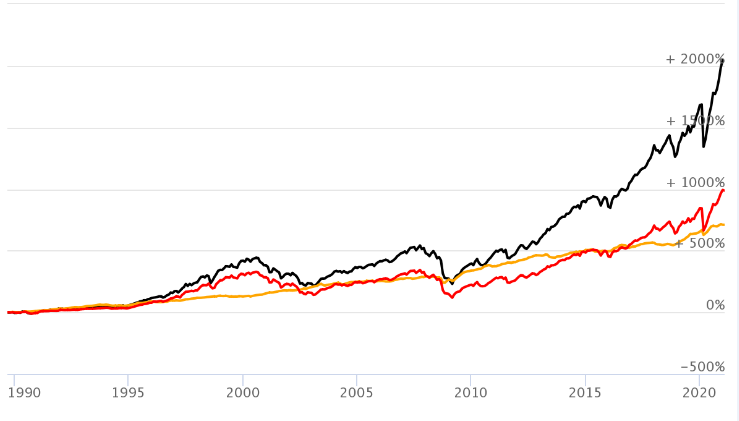Nobody should make hasty decisions because investing is a major decision. An impulsive decision might lead to a loss that will affect your funds and be mentally upsetting. Instead of making money, you can experience losses and lose your peace of mind.
Let’s study more about these items before analyzing the more advantageous and secure investment possibilities available from the two well-liked options: bonds vs stocks.
Bonds vs. Stocks
The equity instrument known as a stock, sometimes capital stock, represents ownership in a corporation. On the other hand, bonds are financial products emphasizing loans from the government or any firm.
Stocks are considered riskier investments in the near term in the bond vs. stock investment comparison because of the volatile stock market. The set interest that bonds pay off makes them a safer investment in the short term. Stocks are typically sold on the stock market, whereas bonds are usually traded over the counter. Lets see the difference on bonds vs stocks
| Bonds | Stocks | |
| Type of Instrument | Financial | Equity |
| Issuers | Government Institutions, Financial Institutions, Companies, etc. | Companies |
| Holder Status | Holders are lenders | Holders are owners |
| Risk Level | Relatively Low | High |
| Return | Interest, which is fixed | Dividend, which is neither fixed nor guaranteed |
| Platform of Trading | Over the counter | Stock market |
| Investment Type | Debt | Equity |
| Duration of Investment | Fixed | Depends on the investor |
| Additional Benefits | Liquidation and preference in terms of repayment | Voting rights in the company |
What are bonds?
In plain English, bonds are loans from an investor known as a bondholder to a firm that issues bonds. Governments or business entities issue bonds to raise money from the market and satisfy their requirement for cash. Typically, each bond has a face value of at least Rs. 1000. In exchange for the money borrowed from an investor at a predetermined interval, the bonds issuer guarantees to pay a fixed coupon rate (interest). The frequency of interest payments might range from monthly to quarterly to biannual to annual.
Bonds typically have a face value, a maturity date, and a fixed rate of interest. Since it is not market-linked, the bond issuer must return the due principal and interest to the bondholders at maturity, regardless of the state of the market.
How To Invest In Bonds?
You have a few alternatives on where to purchase bonds:
Broker– Bonds can be bought via a broker online. This is a method of purchasing from other investors who want to sell their holdings.
Exchange-Traded Fund (ETF): An ETF is a great choice for individual investors since it offers a diversified portfolio and eliminates the need to purchase each bond in increments of $1,000.
Government– Investors can purchase products directly from the Treasury Direct website without using a broker or mediator.
What are stocks?
You can acquire ownership in a company through stocks. You become a part-owner and can vote at some corporate meetings when you decide to purchase shares. If a corporation does well over time, the stock price will increase and vice versa. Your stock investment could result in greater returns, losses, or a complete loss. A stock, often known as equity, is a type of instrument that denotes your ownership interest in the company that issued the stock. A shareholder or stockholder is another name for a stockholder.
How To Invest In Stocks?
You must first create an online investment account to begin investing in stocks on the stock market. Your investing strategy is the first thing you need to consider. You have two choices for your approach to investing:
- You desire to handle your investment management.
- You desire a manager of investments to oversee your account.
Once you’ve made your choice, you can either open a Robo-Advisor account or a brokerage account, depending on whether you want to handle your investments or hire a professional.
Pros and Cons of Bond Investing
Investors’ money is safe in bonds. Debt holders are prioritized over shareholders, so it is a less hazardous option than stocks. Debt holders are paid back before shareholders in the event of bankruptcy of the company. Government bonds have zero risk because you can never lose your initial investment. Bonds provide fixed interest yields that are predictable. Buying bonds is the ideal choice for those who want stability and regularity in their investments. Additionally, bond returns are typically higher than banks’ interest rates on savings accounts. Bonds should be your choice if you seek a long-term, low-risk, safe investment alternative.

| Pros | Cons |
| In terms of interest payments, bonds provide a fixed return. | The majority of Bonds cost a colossal sum of money to purchase. |
| Bonds are less dangerous and the first to be repaid in the event of liquidation. | Bond investing also sacrifices higher potential returns due to its lower level of risk. |
| Bonds are less erratic than equities on the stock market since they fluctuate more slowly. | |
| Bonds are always credited by credit agencies, providing investors with certainty. |
Pros and Cons of Stock Investing
Due to the stock market’s volatility, stocks have the biggest potential return but carry the highest risk level. Although unpredictable, the rewards are larger regarding dividends and capital growth. Starting with just $10, you can begin stock market investing. The value of your investment could quickly increase to $50 if the business you invested in performs successfully. Your gains can be maximized by investing in stocks. Stocks are your best option if you want larger profits and are willing to assume the risk that comes with them.

Pros versus Cons
| Pros | Cons |
| Take advantage of the expanding economy using stocks. The company’s earnings increase as the economy grows. Better dividends and an increase in share price result from this. | You are exposed to market turbulence. Your investment grows and falls in tandem with the stock market as it continuously experiences new highs and lows. |
| Instantly selling stocks on the stock market is a simple way to turn them into cash. | If you must sell your possessions to get cash now, you might have to accept unavoidable losses. |
| Once you’ve created your account, buying and selling shares in the firm of your choice is simple. If you’d rather, you can complete it yourself. | – |
| In the form of dividends and capital returns, you receive a return. | Return on the stock investment is not guaranteed |
| Highest returns are offered | Most-risky investment |
Conclusion
Bonds vs Stocks may continue to compete. They are inversely related to one another. You can achieve your profit and return objectives in the current climate by choosing a well-diversified portfolio of equities and bonds.






